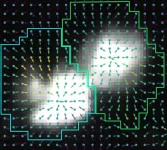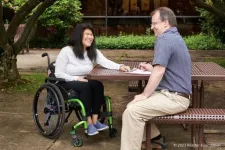(Press-News.org) Researchers in Carnegie Mellon University's School of Computer Science have developed a method that uses artificial intelligence to augment how cells are studied and could help scientists better understand and eventually treat disease.
Images of organ or tissue samples contain millions of cells. And while analyzing these cells in situ is an important part of biological research, such images make it nearly impossible to identify individual cells, determine their function and understand their organization. A technique called spatial transcriptomics brings these cells into focus by combining imaging with the ability to quantify the level of genes in each cell — giving researchers the ability to study in detail several key biological mechanisms, ranging from how immune cells fight cancer to the cellular impact of drugs and aging.
Many current spatial transcriptomics platforms still lack the resolution required for closer, more detailed analysis. These technologies often group cells in clusters that range from several to 50 cells for each measurement, a resolution that may be sufficient for well-represented large cells but that is problematic for small cells or ones that aren't well represented. These rare cells may be the most critical for the disease or condition being studied.
In a new paper published in Nature Methods, Computational Biology Department researchers Hao Chen, Dongshunyi Li and Ziv Bar-Joseph unveiled a method that uses artificial intelligence to augment the latest spatial transcriptomics technologies.
The CMU research focuses on more recent technologies that produce images at a much closer scale, allowing for subcellular resolution (or multiple measurements per cell). While these techniques solve the resolution issue, they present new challenges because the resulting images are so close-up that rather than capturing 15 to 50 cells per image, they capture only a few genes. This reversal of the previous problem creates difficulties in identifying the individual components and determining how to group these measurements to learn about specific cells. It also obscures the big picture.
The algorithm developed by the CBD researchers, called subcellular spatial transcriptomics cell segmentation (SCS), harnesses AI and advanced deep neural networks to adaptively identify cells and their constituent parts. SCS uses transformer models, similar to those used by large language models like ChatGPT, to gather information from the area surrounding each measurement. Just as ChatGPT uses the entire context of a sentence or paragraph for word completion, the SCS method fills in missing information for a specific measurement by incorporating information from the cells around it.
When applied to images of brain and liver samples with hundreds of thousands of cells, SCS accurately identified the exact location and type of each cell. SCS also identified several cells missed by current analysis approaches, such as rare and small cells that may play a crucial role in specific diseases or processes, including aging. SCS also provided information on location of molecules within cells, greatly improving the resolution at which researchers can study cellular organization.
"The ability to use the most recent advances in AI to aid the study of the human body opens the door to several downstream applications of spatial transcriptomics to improve human health," said Ziv Bar-Joseph, the FORE Systems Professor of Machine Learning and Computational Biology at CMU. Such downstream applications are already being investigated by several large consortiums, including the Human BioMolecular Atlas Program (HuBMAP), that are using spatial transcriptomics to create a detailed, 3D map of the human body.
"By integrating state-of the-art biotechnology and AI, SCS helps unlock several open questions about cellular organization that are key to our ability to understand, and ultimately treat, disease," added Hao Chen, a Lane Postdoctoral Fellow in CBD.
SCS is available free on GitHub and was supported by grants from the National Institutes of Health and the National Science Foundation. The paper, "SCS: Cell Segmentation for High-Resolution Spatial Transcriptomics," is available on Nature Methods.
END
Carnegie Mellon University developed AI method uses transformer models to study human cells
2023-08-15
ELSE PRESS RELEASES FROM THIS DATE:
Kessler Foundation receives 4 grants totaling nearly $1.7 million from New Jersey Commission on Brain Injury Research
2023-08-15
East Hanover, NJ – August 15, 2023 – Kessler Foundation scientists received four grants from the New Jersey Commission on Brain Injury Research, totaling nearly $1.7 million for studies based on a variety of novel approaches aimed at improving the lives of individuals with traumatic brain injury (TBI). Researchers will use funds to address identity reconstruction, physical and mental fatigue, and upper limb (UL) function.
Helen Genova, PhD, associate director, Center for Autism Research, received $528,824 for her study, “Using my Strengths: Evaluation of a Strength-Based Intervention in Adults with TBl.” ...
CHOP researchers develop versatile and low-cost technology for targeted long-read RNA sequencing
2023-08-15
Philadelphia, August 15, 2023—In a development that could accelerate the discovery of new diagnostics and treatments, researchers at Children’s Hospital of Philadelphia (CHOP) have developed a versatile and low-cost technology for targeted sequencing of full-length RNA molecules. The technology, called TEQUILA-seq, is highly cost-effective compared to commercially available solutions for targeted RNA sequencing and can be adapted for different research and clinical purposes. The details were described in a paper in Nature Communications.
On the journey ...
New kidney function equation may reduce health disparities by improving access to heart failure therapy in previously ineligible patients
2023-08-15
Physician-scientists from the University of Alabama at Birmingham Marnix E. Heersink School of Medicine recently conducted a large-scale analysis to assess the impact of a newly introduced equation used to evaluate one’s heart failure risk. The study, published in the Journal of Cardiac Failure, showed that the new and old kidney function equations had comparable values in predicting the risk of heart failure.
Naman Shetty, M.D., a clinical research fellow in the UAB Division of Cardiovascular Disease and ...
NIH supports UCF scientist to develop new antibiotic for TB
2023-08-15
BY SUHTLING WONG | AUGUST 15, 2023
A College of Medicine researcher is developing a new antibiotic related to penicillin to treat tuberculosis (TB) and related lung infections.
Dr. Kyle Rohde, an infectious disease expert, recently received a $3.4 million, five-year grant from the National Institutes of Health to create new antibiotics that target mycobacterial infections caused by pathogens such as Mycobacterium tuberculosis and Mycobacterium abscessus.
TB infected 11 million people in 2021, ranking it 13th as the leading cause of ...
An AI coach that improves your golf swing
2023-08-15
A University of Texas at Arlington researcher is working on the prototype of a golf swing training system that combines artificial intelligence (AI) with portability and can be used at home or on the driving range.
Nicholas Gans, a UT Arlington principal research scientist and division head for the UT Arlington Research Institute (UTARI), leads the project, which is funded by a nearly $53,000 grant from the University and Fort Worth-based IGSC.AI LLC. Gans’ initial work is considered a preliminary proof of concept.
“We’ll use a camera-based ...
Cleveland Clinic researchers identify novel host-based target against multiple mosquito-transmitted viruses
2023-08-15
New Cleveland Clinic research shows how mosquito-transmitted viruses – like Zika, West Nile, Yellow Fever and dengue viruses – hijack host cells to promote their own replication and infection. Published in Cell Host and Microbe, a recent study from the laboratory of Michaela Gack, Ph.D., Scientific Director of Cleveland Clinic’s Florida Research & Innovation Center, opens the door to developing new therapeutics for flaviviruses, a class of viruses for which either no or very limited treatments currently exist.
This is Dr. Gack’s first research study funded by a prestigious National ...
New: Cutting-edge natural bioactive molecules effectively reduce cold symptoms
2023-08-15
New York, August 10, 2023 – Researchers at Applied Biological Laboratories Inc. discovered how natural bioactive molecules can effectively relieve cold and flu symptoms by protecting the mucosal barrier function and reducing inflammation during these infections. Together, they call these molecules, which include lysozyme and lactoferrin, the “Mucosal Immune Complex.”
The research, led by Nazlie Sadeghi-Latefi, PhD, highlights the importance of supporting mucosal barrier immunity to prevent and treat colds and flu. This work will be presented at the American Chemical Society Fall 2023 Meeting on August 15, 2023.
Mucosal ...
Benefits of electric stoves on health and environment in Ecuador
2023-08-15
One of the most popular strategies to increase energy efficiency and reduce pollution in homes — which are responsible for approximately 10 percent of greenhouse gas emissions — is the transitioning from gas to electric stoves. An international team of researchers investigated the health and environmental impacts of a program in Ecuador that put induction stoves in 750,000 households.
In the Aug. 15, 2023 online issue of the Proceedings of the National Academy of Sciences, researchers report that both greenhouse gas emissions ...
Novel hardware approach offers new quantum-computing paradigm
2023-08-15
LOS ALAMOS, N.M., Aug. 15, 2023 — A potentially game-changing theoretical approach to quantum computing hardware avoids much of the problematic complexity found in current quantum computers. The strategy implements an algorithm in natural quantum interactions to process a variety of real-world problems faster than classical computers or conventional gate-based quantum computers can.
“Our finding eliminates many challenging requirements for quantum hardware,” said Nikolai Sinitsyn, a theoretical physicist at Los Alamos National Laboratory. He is coauthor of a paper on the approach in the journal Physical Review A. “Natural systems, such as the electronic ...
New online course equips personal care assistants with essential knowledge for supporting individuals with spinal cord injury
2023-08-15
East Hanover, NJ – August 15, 2023 – "Understanding Spinal Cord Injury: A Course for Personal Care Assistants" a new interactive online course designed to enhance the training of personal care assistants (PCAs) for individuals with spinal cord injury, was presented today at the Paralyzed Veterans of America Healthcare (PVA) Summit + Expo at the Renaissance Orlando at SeaWorld Hotel in Orlando, FL, by Jeanne Zanca, MPT, PhD, FACRM, assistant director of the Center for Spinal Cord Injury Research at Kessler Foundation, and chair of the Foundation’s Institutional Review ...




